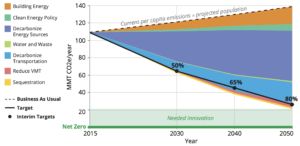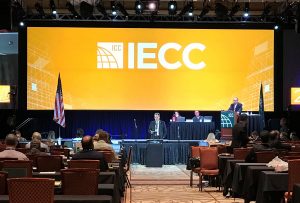
Supporting robust building energy codes and policies meets two objectives in our 2021 Climate Action Plan for the Chicago Region: to implement clean energy policies (green wedge on graph) and to optimize building energy (orange).
Robust building energy codes are one of the most impactful policy actions that municipalities can use to reduce greenhouse gas (GHG) emissions, according to a National Renewable Energy Lab (NREL) study. The Caucus has been working for several years to advocate for strong energy efficiency codes at the international (International Code Council, or ICC) and state levels. The Caucus identified implementing clean energy policies, such as robust codes or benchmarking, as an objective in our 2021 Climate Action Plan for the Chicago Region. After local governments implement clean energy policies, their efforts will help to optimize building energy, which is another important objective in the Climate Action Plan for significantly reducing greenhouse gas emissions (GHG) in our region.
ABEEP Task Force
The Caucus started working with Slipstream and the Midwest Energy Efficiency Alliance (MEEA) in 2022 and convened an Advanced Building Energy Efficiency Policies (ABEEP) Task Force of municipalities that are considering advanced building policies for their communities, such as stretch codes, benchmarking and BPS. The stretch codes create higher standards for energy efficiency and reduced GHG emissions in new construction and major renovations, as compared to the statewide base energy code. Benchmarking policies require owners of certain existing buildings to report how much energy the buildings consumed. Building Performance Standards (BPS) policies build on benchmarking ordinances by setting both interim and long-term targets for reducing energy use in those buildings.
At the periodic ABEEP Task Force meetings, 20+ communities meet to learn about stretch codes, benchmarking, and building performance standards, and the ABEEP team helps prepare local governments to adopt these policies. The assistance offered to municipalities includes several fact sheets, one-on-one meetings with communities, presentations to internal or external stakeholders, and preparations for local town hall meetings on the topic. The ABEEP Task Force is funded by ComEd.
To view past meeting materials, including presentation slides, recordings, and fact sheets, go to the ABEEP Task Force Meeting Materials webpage.
Background on Our Involvement in Energy Codes – 2021 IECC

City of Geneva Mayor Kevin Burns, Chairman of the Caucus Executive Board and the Environment and Energy Committee, testified to improve energy efficiency building codes at the International Code Council (ICC) public comment hearings in 2019.
The Energy Efficient Building Act requires the Capital Development Board to review and adopt the most current version of the International Energy Conservation Code (IECC) as minimum construction requirements. The Board updates the IECC every three years, and state amendments may be added to the energy code.
In 2019, we encouraged our municipalities to voice their opinion on proposed changes to the 2021 IECC by participating in the online voting process. Our member municipalities voted in record numbers to support stronger building energy efficiency codes. The 2021 IECC was expected to be the most energy efficient code to date, which would provide energy savings of approximately 10% in new residential buildings, compared to the current state energy code.
However, during the amendment process in 2021, several amendments were proposed that would weaken the IECC, in some cases rolling back energy efficiency by as much as 20%. The members who were on the Illinois Energy Conservation Advisory Council at the time voted to approve many of these weakening amendments.
In August of 2022, we asked municipalities to sign on to a comment letter written by MEEA to support the unweakened 2021 IECC for various reasons. For one, the weakened 2021 IECC was contrary to the intent of the Climate and Equitable Jobs Act (CEJA), which was hailed as “the most significant step Illinois has taken in a generation toward a reliable, renewable, affordable and clean energy future” by Governor J.B. Pritzker. A second reason to oppose a weakened base code is that it would prevent Illinois from accessing $1 billion in Inflation Reduction Act funding. One-third of this funding can go to states that meet or exceed the 2021 IECC.
In a surprising turn of events, the Capital Development Board (CDB) released a statement on Dec. 5, 2022, which said that any amendments that were weaker than the 2021 IECC would be removed from the state’s proposed code to better align the document with Gov. Pritzker’s climate change initiatives and statewide energy conservation goals.
In November 2023, JCAR approved the 2021 IECC with some weakening amendments. Then the Capital Development Board also approved the code language, which made the 2021 IECC with weakening amendments the official state law, causing Illinois to lose access to $330 million in IRA grants. The IRA funding could have supported jurisdictions in adopting, implementing, and enforcing the code. The effective date for the state’s 2021 IECC was Jan. 1, 2024. The 2021 IECC can be accessed at the Capital Development Board website.
Media Coverage
Find additional news stories and Caucus articles on the topic below:
- How a suburban Chicago Mayor helped inspire the biggest jump in building energy code improvements in a decade – Energy News Network, June 3, 2020
- Why industry is blocking the push for more energy efficient homes – Washington Post, Feb. 21, 2024
- The Industry ‘Scandal’ That Might Completely Upend How America Builds Houses – HuffPost, Feb 5, 2024
- Caucus Takes Action on Energy Efficient Codes – Caucus, Oct. 31, 2019
- Secret Deal Helped Housing Industry Stop Tougher Rules on Climate Change – The New York Times, Oct. 26, 2019
Energy Goals
![]() Supporting robust energy codes is aligned with many of the energy goals and strategies of the Greenest Region Compact and the Climate Action Plan for the Chicago Region. Some of these goals and strategies include enacting policies that support clean energy, reducing energy consumption, adopting the stretch codes, and supporting robust building energy conservation codes.
Supporting robust energy codes is aligned with many of the energy goals and strategies of the Greenest Region Compact and the Climate Action Plan for the Chicago Region. Some of these goals and strategies include enacting policies that support clean energy, reducing energy consumption, adopting the stretch codes, and supporting robust building energy conservation codes.
